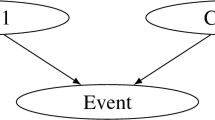Abstract
There is a substantial literature on the Bayesian approach, and the application of Bayes' theorem, to legal matters. However, I have found no discussion that explores fully the issue of how a Bayesian juror might be led from an initial "presumption of innocence" to the judgment (required for conviction in criminal cases) that the suspect is "guilty beyond a reasonable doubt". I shall argue here that a Bayesian juror, if she acts in accord with what the law prescribes, will virtually never reach such a judgment. In section I, I discuss Bayesianism, Bayes' rule and the relation between them. Section II addresses the two legal notions key to my worries about Bayesian jurors: the presumption of innocence and the reasonable doubt criterion. Section III explores what a Bayesian is to make of these notions, and how the legal system requires her to reason in their light. If I am right, there emerges a conflict between current legal prescriptions and the Bayesian approach. Section IV explores the import of this conflict and how it might be resolved.
Similar content being viewed by others
References
Bayes, T.: 1763, 'Essay towards Solving a Problem in the Doctrine of Chances', Phil.Trans.Roy.Soc. 53, 370–418 (Reprinted in Biometrika: 1958, 45, 293–315).
Blackstone, W.: 1807, The Law of England, Book the Fourth, Portland: T. Wait and Co.
Cohen, L.J.: 1977, The Probable and the Provable, Oxford: Clarendon Press.
de Finetti, B.: 1930, 'Fondamenti Logici del Ragionamento Probabilistico', Boll.Un.mat.Ital. 9 (Ser.A), 258–261.
de Finetti, B.: 1937, 'La Prévision: Ses Lois Logiques, Ses Sources Subjectives', Ann.Inst.Henri Poincaré 7, 1–68.
Edwards, W., Lindman, H. and Savage, L.J.: 1963, 'Bayesian Statistical Inference for Psychological Research', Psychological Review 70(3), 193–242.
Evett, I.W.: 1983, 'What is the Probability that This Blood Came from That Person? A Meaningful Question?', Journal of the Forensic Science Society 23, 35–39.
Fienberg, S. and Kadane, J.B.: 1983, 'The Presentation of Bayesian Statistical Analyses in Legal Proceedings', The Statistician 32, 88–98.
Finkelstein, M.O. and Fairley, W.B.: 1970, 'A Bayesian Approach to Identification Evidence', Harvard Law Review 83(3), 489–517.
Finkelstein, M.O. and Fairley, W.B.: 1971, 'A Comment on “Trial by Mathematics”', Harvard Law Review 84(8), 1801–1809.
Glymour, C.: 1980, Theory and Evidence, Princeton: Princeton University Press.
Goodman, N.: 1983, Fact, Fiction, and Forecast (4th ed.), Harvard University Press.
Jeffrey, R.C.: 1983, The Logic of Decision (second edition), Chicago: University of Chicago Press.
Jeffrey, R.C.: 1992, Probability and the Art of Judgment, Cambridge: Cambridge University Press.
Lindley, D.V.: 1977, 'Probability and the Law', The Statistician 26(3), 203–220.
Lindley, D.V.: 1983, 'Theory and Practice of Bayesian Statistics', The Statistician 32, 1–11.
Ramsey, F.P.: 1931, 'Truth and Probability' (1926) and 'Further Considerations' (1928) in The Foundations of Mathematics and Other Essays, New York: Harcourt, Brace.
Tribe, L.H.: 1971a, 'Trial by Mathematics: Precision and Ritual in the Legal Process', Harvard Law Review 84(6), 1329–1393.
Tribe, L.H.: 1971b, 'A Further Critique of Mathematical Proof', Harvard Law Review 84(8), 1810–1820.
Wigmore, J.H.: 1981, Evidence in Trials at Common Law, Vol. 9, revised by J.H. Chadbourn, Boston: Little, Brown & Co.
Author information
Authors and Affiliations
Rights and permissions
About this article
Cite this article
Rawling, P. Reasonable Doubt and the Presumption of Innocence: The Case of the Bayesian Juror. Topoi 18, 117–126 (1999). https://doi.org/10.1023/A:1006290104372
Issue Date:
DOI: https://doi.org/10.1023/A:1006290104372



